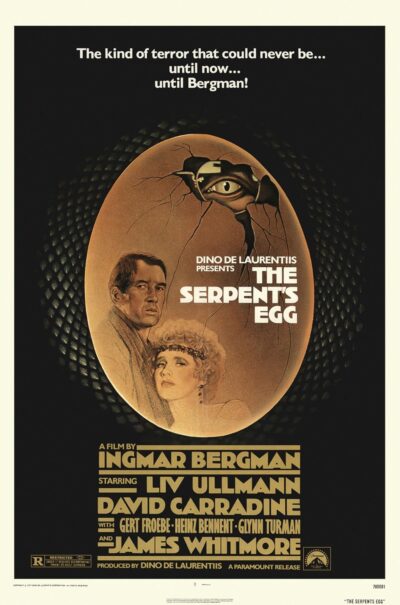 In his day Ingmar Bergman made several mislabeled horror films. They include THE VIRGIN SPRING/Jungfrukällan (1960), HOUR OF THE WOLF/Vargtimmen (1968), FROM THE LIFE OF THE MARIONETTES/ Aus dem Leben der Marionetten (1980) and THE SERPENT’S EGG (1977), which is widely considered Bergman’s biggest folly, yet also marked his greatest financial success (in Europe). Bergman had in 1976 exiled himself from his native Sweden (due to tax issues) and resettled in Germany. It was there that he helmed THE SERPENT’S EGG, a generously budgeted English language period piece made under the auspices of mega-producer Dino De Laurentiis (1919-2010).
In his day Ingmar Bergman made several mislabeled horror films. They include THE VIRGIN SPRING/Jungfrukällan (1960), HOUR OF THE WOLF/Vargtimmen (1968), FROM THE LIFE OF THE MARIONETTES/ Aus dem Leben der Marionetten (1980) and THE SERPENT’S EGG (1977), which is widely considered Bergman’s biggest folly, yet also marked his greatest financial success (in Europe). Bergman had in 1976 exiled himself from his native Sweden (due to tax issues) and resettled in Germany. It was there that he helmed THE SERPENT’S EGG, a generously budgeted English language period piece made under the auspices of mega-producer Dino De Laurentiis (1919-2010).
As recalled by author Bruce Bahrenburg, prior to making this film Bergman visited the set of De Laurentiis’ 1976 KING KONG remake, during which time Bergman was said to have pointed out that he could make two entire films for what KING KONG’s makers spent on a single prop, and was puzzled by a quip from director John Guillerman about the prep time being “not long enough.” Big budget filmmaking, in short, was not Bergman’s forte, and the fact that he was hopelessly out of place directing THE SERPENT’S EGG, filmed on soundstages in Munich (as opposed to the on-location shooting of most of Bergman’s previous films), is evident throughout.
The setting is Berlin in November 1923, where “most everyone has lost faith in both the future and the present.” Food shortages, wanton brutality, anti-Semitism and a never seen (but oft-remarked-upon) political agitator named Adolph Hitler are among the calamities affecting the populace. Enter the alcoholic trapeze artist Abel Rosenberg (David Carradine), who travelled to Germany a month earlier with his brother Max (Hans Eichler) and the latter’s cabaret dancer wife Manuela (Liv Ullmann), and is currently unemployed. After happening upon the bloody corpse of Max, who’s shot himself in the head, Abel moves in with Manuela.
It transpires that several mysterious deaths have occurred in the vicinity, for which Abel comes under suspicion. He also goes to work as an archivist at a medical Clinic, in which the explanation for the deaths, involving a series of deeply unethical medical experiments, becomes clear. Before that, however, one of the protagonists will die horribly and another will meet an ominous fate, with the production design growing increasingly expressionistic (as in what Carradine described as a “blood vessel room”) and the characters behaving in a highly irrational manner (for which a scientific rationale is eventually offered) in a narrative that undergoes an astonishingly bleak—read: Bergmanesque—arc.
This film isn’t nearly as terrible as many critics have made it out to be, although it’s no masterpiece. It’s most interesting as an atmospheric depiction of Weimar Berlin, superbly captured by Bergman’s usual cinematographer Sven Nykvist, that’s more in line with CABARET (1972) than PERSONA (1966) or THE SEVENTH SEAL/Det sjunde inseglet (1957). Contained are copious wide shots of busy streets teeming with costumed extras that are far removed from Bergman’s usual close-up heavy style; the loss of that intimate aesthetic results in diminished characterizations and a loose narrative that requires off-screen narration to fill in the details.
Another departure from Bergman’s standard practice is the top-heavy name cast, which includes Gert Fröbe as a police inspector, James Whitmore as a priest, Glynn Turman as a sex freak and Heinz Bennent as the architect of all the mayhem. Overshadowing them all are Bergman’s favorite actress Liv Ullmann and David Carradine (in place of the director’s preferred lead Elliot Gould), essentially reprising his role in KUNG FU (1972-75) as a dispassionate observer who’s occasionally called upon to perform acrobatic stunts, as in a chase through a police station in which Carradine kicks a man down stairs and performs no less than two death-defying high jumps.
Vital Statistics
THE SERPENT’S EGG
Dino de Laurentiis Corporation/Rialto Film
Director: Ingmar Bergman
Producer: Dino de Laurentiis
Screenplay: Ingmar Bergman
Cinematography: Sven Nykvist
Editing: Petra von Oelffen
Cast: David Carradine, Liv Ullmann, Gert Fröbe, Heinz Bennent,
James Whitmore, Toni Berger, Christian Berkel, Paula Braend, Erna Bruenel, Paul Buerks, Gaby Dohm, Emil Feist, Kai Fischer, Georg Hartmann, Edith Heerdegen, Klaus Hoffmann, Grischa Huber, Volkert Kraeft, Gunther Malzacher, Glynn Turman
